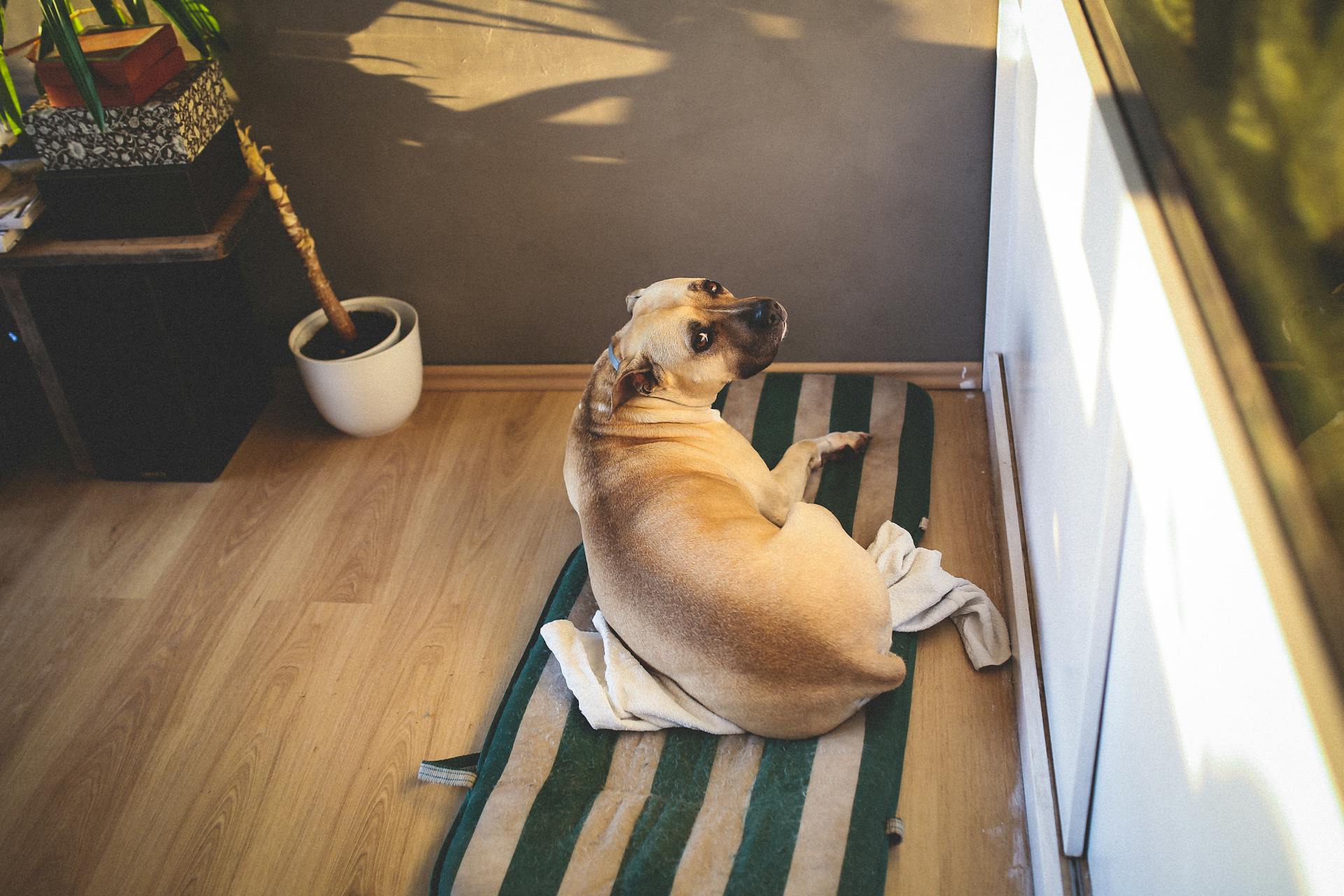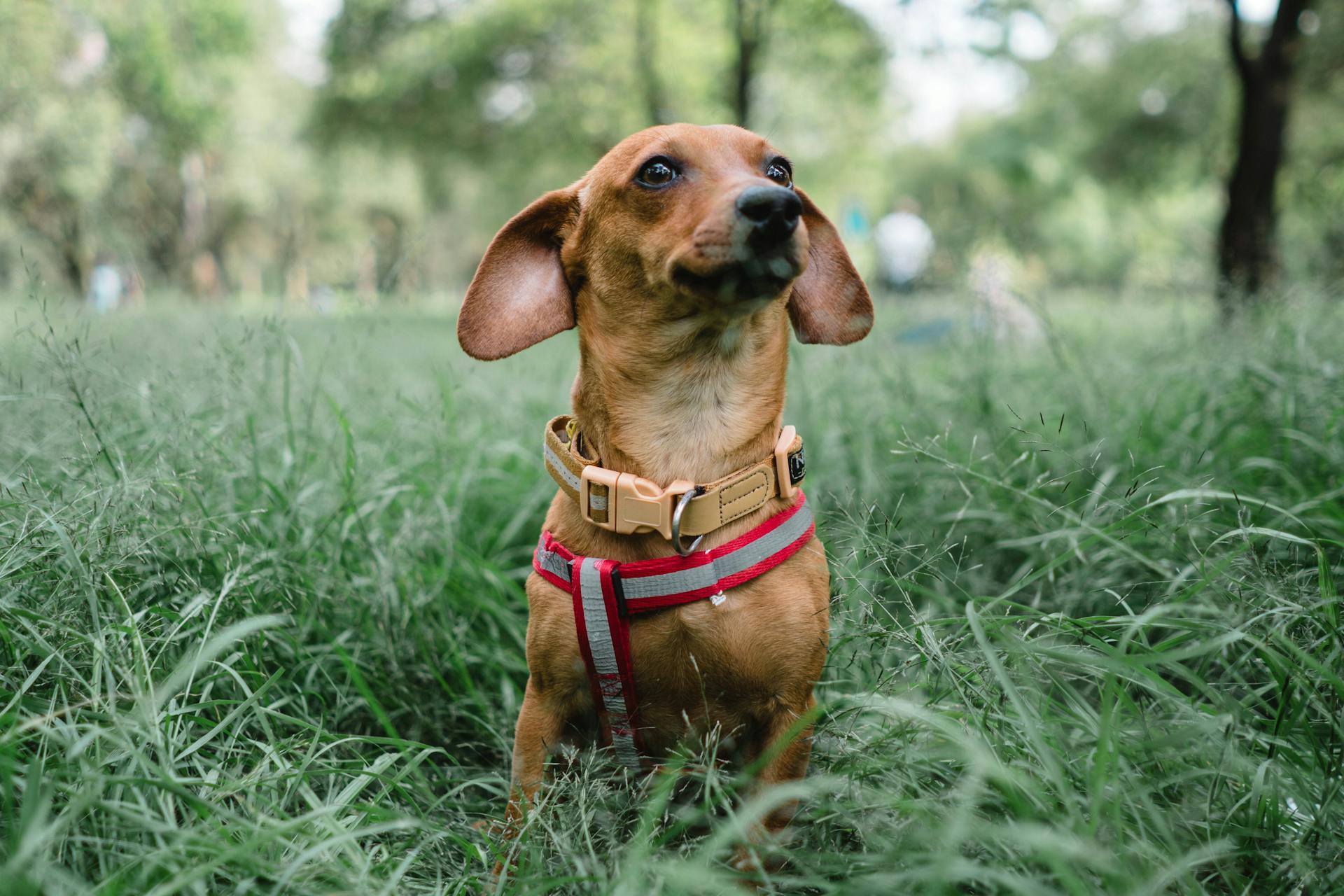
At four months old, your Bernese Mountain Dog is still a puppy, but they're growing fast. They should weigh around 25-35 pounds and stand about 18-20 inches tall.
Their coat is still developing, but it's likely to be a thick, double coat that sheds heavily. Be prepared for regular grooming sessions to prevent matting and tangling.
As they're still a puppy, they need plenty of exercise to keep them happy and healthy. Aim for at least two 15-minute walks and plenty of playtime each day.
Their diet should still be high in protein and fat to support their growth and development. Feed them three to four times a day, and make sure they always have access to fresh water.
Related reading: Bernese Mountain Dog Coat
Growth and Development
At four months old, your Bernese Mountain Dog is likely still growing rapidly. They have considerable growing left to do, so it's essential to monitor their progress.
Your puppy's current age is a good starting point to estimate how much bigger they'll get. If they're less than a year old, they'll continue to fill out their chest and gain weight, but the extra pounds should be minimal.
Take a look at your puppy's paws - are they oversized next to their body and legs? If so, it's a classic adolescent feature, indicating they're still growing.
You can use the Bernese Mountain Dog growth chart to estimate how much more your pup may grow based on their current age. This will give you a better idea of their adult size.
If you're still unsure, you can reach out to the breeder who sold you your puppy. They should be able to provide a more precise estimate of your pup's adult weight and height based on their parents and past litters.
Suggestion: Adult Portuguese Water Dogs
Health and Nutrition
As a Bernese Mountain Dog owner, it's essential to be mindful of your furry friend's weight from a young age. Nearly 60% of dogs in America are obese, which can lead to serious secondary health complications including diabetes and arthritis.
Feeding your 4-month-old Bernese Mountain Dog puppy requires careful attention to their diet and exercise. Puppies have specific needs, and Bernese Mountain Dogs are prone to obesity, so it's crucial to stick to recommended amounts at mealtimes.
A suitable amount of calcium is also essential for developing bones, and any dog food that meets the AAFCO's Growth and Maintenance nutrient profile will contain a suitable amount of calcium.
Ensuring Healthy Gut Bacteria
A healthy gut is just as important as a healthy body for your Bernese Mountain Dog. Nearly 60% of dogs in America are obese, which can lead to serious secondary health complications including diabetes and arthritis.
Your dog's diet plays a big role in maintaining a healthy gut. A poor diet can disrupt the balance of gut bacteria, leading to a range of issues.
Regular exercise is also crucial for a healthy gut. Exercise helps stimulate digestion and keep the gut lining healthy.
Bernese Mountain Dogs are prone to genetic diseases, including hip dysplasia and eye cataracts. But did you know that a healthy gut can actually help prevent or alleviate some of these issues?
Feeding your dog a balanced diet rich in fiber can help promote healthy gut bacteria.
Consider reading: Bernese Mountain Dog Health Issues
Feeding
Feeding your Bernese Mountain Dog requires careful attention to their diet and exercise. Bernese Mountain Dogs are prone to obesity, which can lead to serious health complications.
You should be strict with recommended amounts at mealtimes, as they have a tendency to overeat. This breed eats a lot, so it's essential to monitor their food intake closely.
New pet parents can get reimbursed for up to 90% of veterinary bills by enrolling in a pet insurance plan, which can give you peace of mind knowing your puppy will have access to gold-standard veterinary care for life.
Bernese Mountain Dog puppies need to be careful with tasty treats, as they can easily overdo it on calories. You should only give them 10% of their calorific allowance through treats.
It's also crucial to avoid giving your puppy too much calcium, as excessive calcium can lead to elbow and hip dysplasia later in life. Any dog food that meets the AAFCO's Growth and Maintenance nutrient profile will contain a suitable amount of calcium for developing bones.
A fixed feeding schedule can help your dog get used to when they will be fed, reducing whining and begging. Offer several small meals during the day instead of one large meal once a day.
Make sure your dog always has access to enough fresh drinking water, especially in the summer when they may need it more. This is especially important for Bernese Mountain Dogs, as they are susceptible to kidney problems.
Broaden your view: Bernese Mountain Dog Food Calculator
Grooming Your
At four months old, your Bernese Mountain Dog is still a puppy, but it's essential to establish a grooming routine to prevent matting and tangling of their thick coat. Brush them at least once a week to remove loose hair, especially during warmer months.
You'll want to get your puppy used to nail clipping, teeth brushing, and ear cleaning as soon as possible, as it's easier to do when they're smaller and less likely to resist. This will make grooming a breeze as they grow.
Bernese Mountain Dogs shed a lot, so be prepared to find their hair on your clothes, sofa, and curtains. Brushing them twice a week can help manage this, but it's impossible to completely prevent dog hair in the home.
Pay special attention to areas where their hair tends to get tangled, such as their armpits, under their tail, neck, and chest. Regularly trimming the hair between their pads will also help them walk comfortably.
As your puppy grows, they'll need more frequent grooming, including nail clipping and ear cleaning. Check their ears at least once a week with a damp cloth to prevent infections.
Take a look at this: Do Corgis Need Grooming
Training and Socialization
At four months old, your Bernese Mountain Dog puppy is still a big softie, but they need to undergo effective socialization to prevent behavioral issues in later life. They're naturally intimidating, and people and other dogs are more scared of them when they bark or jump up.
To socialize your puppy, introduce them to new people, dogs, surfaces, and environments once they're properly vaccinated. This will help them get used to all the stimulation they'll encounter in life.
It's essential to give your puppy about a week or two to bond with you before introducing them to new experiences. This will help them feel secure and confident.
Invite friends and family over to help your puppy get used to new people, and visit dog-friendly places with clean floors to expose them to new surfaces and environments.
A unique perspective: Miniature Bull Terrier Lifespan
Raising and Care
As a Bernese Mountain Dog owner, you're probably eager to get your 4-month-old pup out and about, but it's essential to remember that they're still growing and need to pace themselves. Until they're 1 year old, they should have short walks 6 to 8 times a day, for 10 minutes at a time.
Keep an eye on your puppy's behavior and watch for signs that they're getting tired, like lying down. Don't push them to do more, let them rest until they're ready to get up and go again.
It's also crucial to avoid activities that can lead to injuries or abnormal development, like climbing stairs or walking on slippery surfaces, until their joints are fully developed.
Raising
Raising a Bernese puppy requires patience and consistency.
Until your puppy is 1 year old, it's essential not to overdo their activities, as they need their energy to grow. Take them for short walks 6 to 8 times a day, for 10 minutes at a time.
Keep an eye on your puppy's behavior when you're out walking or playing, and let them rest if they lie down. Don't force them to do anything more at this point.
Bernese puppies should not be allowed to climb stairs or walk on the beach until they're 1 year old. Be mindful of slippery surfaces, as your dog's joints are not yet fully developed and unstable surfaces can lead to injuries or abnormal development.
Rewarding good behavior is key to training a Bernese puppy. A hug and praise can be just as effective as a treat.
Consistency is crucial during puppy training, as trying to do too much at once can have the opposite effect.
Other Care

Regular ear cleaning is a must, especially for Bernese dogs who are prone to painful ear infections. Clean their ears at least once a week with a damp cloth.
You should also keep an eye on your dog's nail length. If they mostly walk on grass and carpets, their nails will need regular clipping.
Checking your dog's eyes regularly is a good habit to get into. Remove any dry debris with a clean cotton cloth or some tissue paper if you notice any.
Dogs that walk on hard surfaces often tend to wear down their nails automatically.
Key Milestones: 4-6 Months
At 4-6 months, your Bernese Mountain Dog is likely to be a ball of energy and curiosity.
Puppies can begin obedience training after their second round of vaccines, meaning there will be a ton of learning (and growing) in this time.
You'll notice your puppy's growth spurt is slowing down, but they're still getting bigger and stronger every day.
Frequently Asked Questions
Are Bernese Mountain Dog puppies difficult?
Bernese Mountain Dog puppies are relatively easy to train due to their gentle nature, but they can be sensitive and require patient, gentle training. They also need regular attention and socialization to prevent separation anxiety.
How long does it take for a Bernese Mountain Dog to be fully grown?
Bernese Mountain Dogs typically reach full growth and maturity between 2-3 years old, with some continuing to develop and add bulk until middle age. Expect your Berner to look a bit gangly during the first 18 months, but don't worry, they'll fill out beautifully with time!
Sources
- https://www.pawlicy.com/blog/bernese-mountain-dog-growth-and-weight-chart/
- https://wagwalking.com/daily/bernese-mountain-dog-puppy-guide
- https://www.yarrah.com/en/bernese-mountain-dogs/
- https://www.dogbreedinfo.com/bernesemountain.htm
- https://www.akc.org/expert-advice/dog-breeds/train-bernese-mountain-dog-puppy-milestone-timeline/
Featured Images: pexels.com


